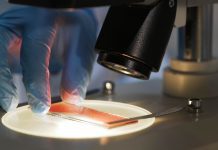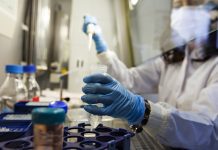cancer research Related News
The importance of sex differences in pancreatic cancer treatment
Researchers from Karolinska Institutet have found that certain immune cells in women with pancreatic cancer can obstruct their immune response.
The findings may explain differences...
Researchers have developed a revolutionary new bone cancer treatment
Researchers from the University of East Anglia (UEA) have developed a new, non-invasive bone cancer treatment that is effective against all primary forms of...
People with a history of atopy are less like to develop melanoma
A study from the University of Eastern Finland found fewer cases of melanoma and skin cancer in people with a history of atopy.
Atopy refers...
Improving prostate cancer treatment and diagnostics in the UK
We spoke to Amy Rylance, Head of Improving Care at Prostate Cancer UK, about advancements in diagnostics, research and what can be done to...
New research says actin plays a key role in the spread of cancer
Researchers from the University of Freiburg found that the release of so-called prometastatic factors is influenced by proteins in the cells’ skeleton called actin.
According...
Researchers develop new precision therapy for bile duct cancer
University College London (UCL) researchers have developed a precision therapy for bile duct cancer that extends patients’ lives.
Bile duct cancer is cancer that’s found...
New gene editing technology may treat resistant childhood leukaemia
A team of researchers have engineered donor T-cells to treat childhood leukaemia that is resistant to other therapies.
The Phase I trial, conducted by University...
The cause of medulloblastoma relapse has been found by researchers
Researchers from Uppsala University have discovered the protein that makes tumour cells insensitive to medulloblastoma radiation treatment and causes relapse.
Medulloblastoma is a malignant brain...
Liquid biopsies could be used to detect blood cancer
Researchers have found that liquid biopsies can detect blood cell disorders than can help identify patients at risk of blood cancer.
Cancer tumours release DNA...
Tackling challenges in cancer through global collaboration
Cancer Grand Challenges is an initiative bringing together a global community of investigators and world-class research teams to address some of the toughest challenges...
A high-fibre diet could increase the risk of liver cancer
A high-fibre diet may increase the risk of liver cancer in some individuals, according to new research from the University of Toledo.
A fibre-rich diet...
Defence Therapeutics applauds US President’s anti-cancer initiative
Defence Therapeutics Inc, a Canadian biotech company actively working on accelerating scientific discoveries an products development against cancer, congratulates US President, Joe Biden on...
A new cancer screening method could revolutionise treatment
A new study, supporting the accuracy of multi-cancer early detection (MCED), could have significant implications for the future of cancer screening, care, and provision.
According...
Researchers find method for improved pancreatic cancer treatment
A study from the Systems Oncology Lab at Champalimaud Research, published on September 9, has provided a potential solution to the issues surrounding pancreatic...
Potential new therapy for relapsed multiple myeloma patients
Mount Sinai researchers have discovered a potential therapy option for patients with multiple myeloma.
Multiple myeloma is a type of bone marrow cancer. It is...
Simple blood test could diagnose small cell lung cancer
Scientists have potentially discovered a method using a blood test to diagnose and characterise early-stage small cell lung cancer.
Researchers from the University of Manchester...
Defence’s ACCUMTM variant “A1” converts mesenchymal stromal cells into potent antigen presenting cells
Defence Therapeutics has announced groundbreaking news about the development of a novel anti-cancer cellular vaccine using reprogrammed mesenchymal stromal cells.
Defence Therapeutics Inc., a Canadian...
Smart contact lenses potentially detect cancer biomarkers
Scientists have developed contact lenses that can capture and detect exosomes, which could be cancer biomarkers.
The Terasaki Institute for Biomedical Innovation (TIBI) has developed...
Defence Therapeutics receives US patent for its ADC Platform Technology
In an exciting development, Defence Therapeutics has received a US patent covering its ADC Platform Technology.
In the latest announcement on August 8th, 2022, Defence...
Queen’s University Belfast awarded funding for breast cancer treatment research
Researchers at Queen’s University Belfast have received funding from Breast Cancer Now to discover new breast cancer treatments.
This new research is inspired by the...





















